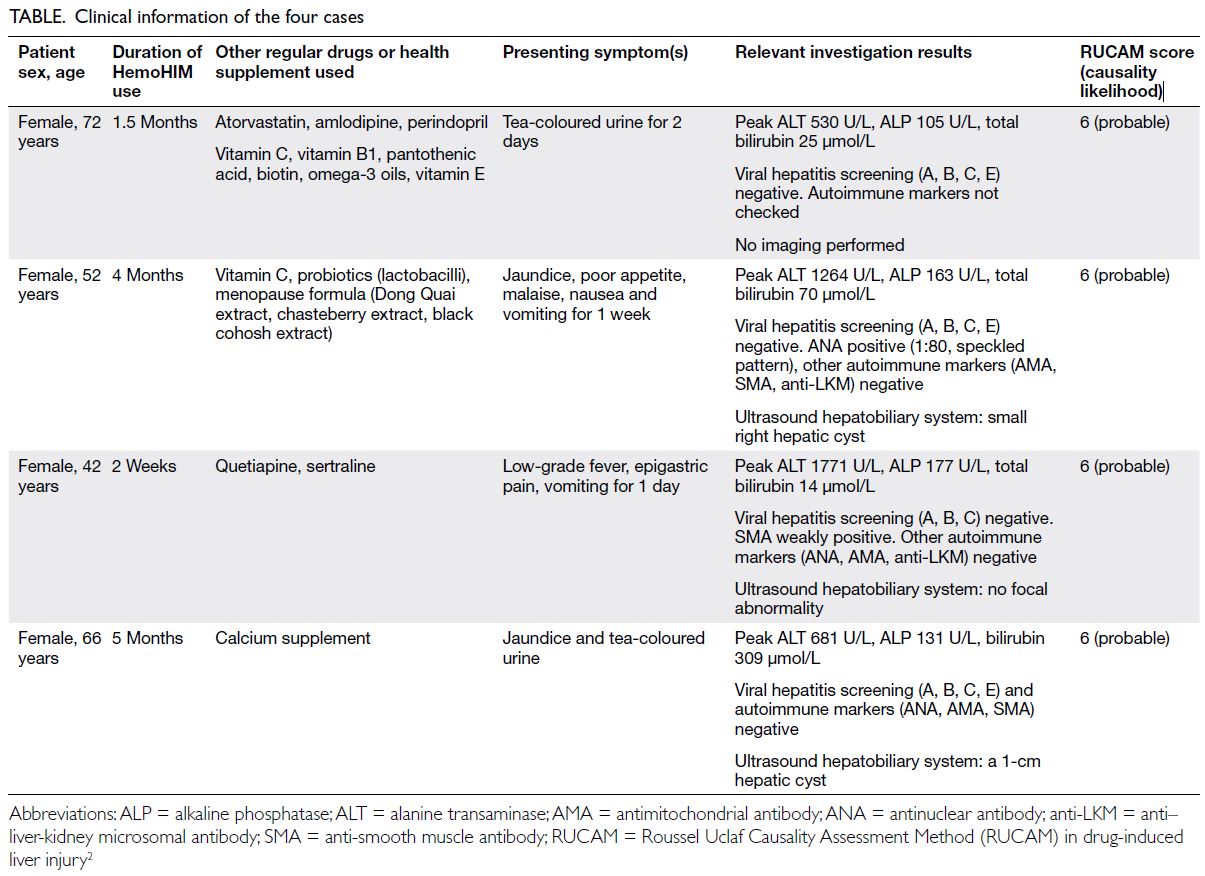© Hong Kong Academy of Medicine. CC BY-NC-ND 4.0
LETTER TO THE EDITOR
Liver injury associated with the use of health
supplement HemoHIM
CK Chan, FHKAM (Emergency Medicine), Dip Clin Tox (HKPIC & HKCEM)1; Raymond SM Wong, FHKCP, FHKAM (Medicine)2; Jones CM Chan, FHKCP, FHKAM (Medicine)2; YK Chong, FHKAM (Pathology)3; Jamie Au Yeung, MClinPharm, BPharm (Hons)4; TH Yung, MSc (Clinical Pharmacy), B Pharm in Chinese Medicine4
1 Hong Kong Poison Information Centre, United Christian Hospital, Hong Kong
2 Prince of Wales Hospital Poison Treatment Centre, Hong Kong
3 Hospital Authority Toxicology Reference Laboratory, Hong Kong
4 Hospital Authority Chief Pharmacist’s Office, Hong Kong
Corresponding author: Dr CK Chan (chanck3@ha.org.hk)
To the Editor—A recent press release issued by
the Department of Health of the Hong Kong SAR
Government urged public not to buy or consume an
oral health supplement “HemoHIM”.1 This product has
been withdrawn from the market in Hong Kong, Taiwan
and Singapore. In Hong Kong, from April to September
2021, four women presented to public hospitals because
of acute hepatitis (Table).2 All patients had consumed
a health supplement named HemoHIM (Atomy;
Gongju, South Korea) and liver function improved after
cessation of use. No alternative medical causes were
identified. A sample of HemoHIM was analysed by high-performance
liquid chromatography with diode-array
detection and liquid chromatography–tandem mass
spectrometry, revealing the presence of methoxsalen, psoralen, and benign herbal markers. Subsequent
analysis of additional samples from different sources
showed consistent laboratory findings. Methoxsalen
(also known as 8-methoxypsoralen, 8-MOP) and
psoralen are naturally occurring furocoumarins. They
can be found in a number of plant species at various
concentrations and are collectively referred to as
psoralens. Psoralens have photosensitising property,
thus methoxsalen is formulated as drugs used in
PUVA (Psoralen and ultraviolet light UVA) treatment
for psoriasis and vitiligo.3 Psoralens bind to DNA
when exposed to ultraviolet light, inhibiting DNA
synthesis and causing a decrease in cell proliferation.
Methoxsalen- and psoralen-containing herbs have
been reported to cause liver injuries.3 4 The listed herbal ingredients of HemHIM should not contain psoralen
or methoxsalen. Further investigations are needed to
explain the occurrence of these chemical compounds
in the product. Several plant species used in traditional
Chinese medicine have been reported to contain
psoralens,5 including Fructus Psoraleae (補骨脂, the
dried seeds of Psoralea corylifolia), which contains a
relatively high concentration of psoralens.2 3 Frontline
doctors should be vigilant to patients presenting
with symptoms of liver injury after consumption of
HemoHIM or other supplements containing Fructus Psoraleae.
Author contributions
CK Chan drafted the letter and all authors contributed to the
critical revision of the letter for important intellectual content.
All authors approved the final version for publication and take
responsibility for its accuracy and integrity.
Conflicts of interest
All authors have disclosed no conflicts of interest.
Funding/support
This letter received no specific grant from any funding agency in the public, commercial, or not-for-profit sectors.
References
1. Hong Kong SAR Government. DH investigates suspected
poisoning cases relating to oral product “HemoHIM”. 1
Nov 2021. Available from: https://www.info.gov.hk/gia/general/202111/01/P2021110100785.htm. Accessed 15 Nov 2021.
2. LiverTox: clinical and research information on drug-induced
liver injury. Bethesda (MD): National Institute of Diabetes and
Digestive and Kidney Diseases; 2012-. Roussel Uclaf Causality
Assessment Method (RUCAM) in drug induced liver injury.
Updated 4 May 2019. Available from: https://www.ncbi.nlm.nih.gov/books/NBK548272/. Accessed 15 Nov 2021.
3. Cheung WI, Tse ML, Ngan T, et al. Liver injury associated
with the use of Fructus Psoraleae (Bol-gol-zhee or Bu-gu-zhi)
and its related proprietary medicine. Clin Toxicol (Phila)
2009;47:683-5. Crossref
4. Li A, Gao M, Zhao N, Li P, Zhu J, Li W. Acute liver failure associated with Fructus Psoraleae: a case report and literature review. BMC Complement Altern Med 2019;19:84. Crossref
5. Guo Jia Zhong Yi Yao Guan Li Ju “Zhonghua Ben Cao” Bian Wei Hui. Zhong Hua Ben Cao (中華本草) [in Chinese]. Shanghai: Shanghai Ke Xue Ji Shu Chu Ban She; 1999.


